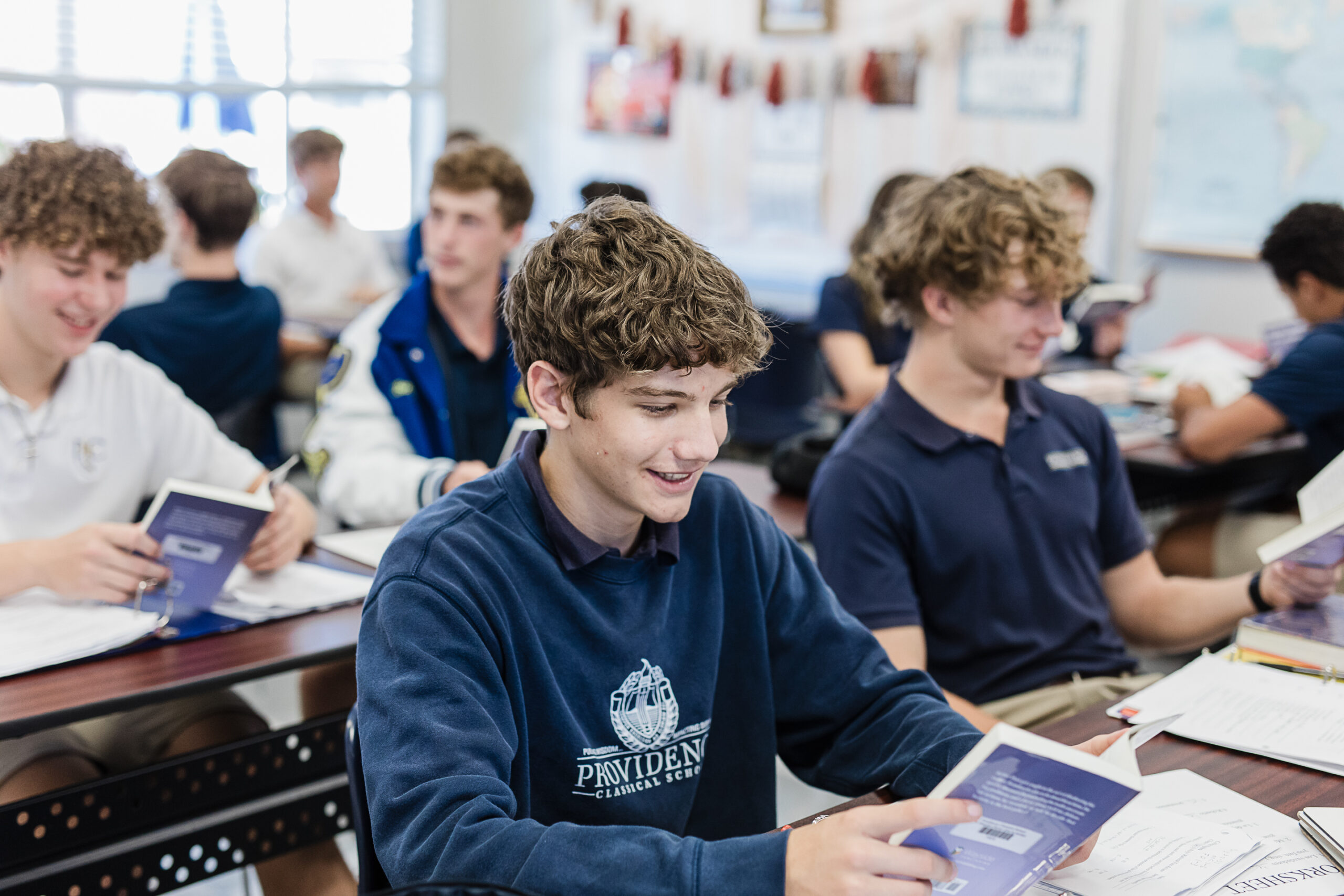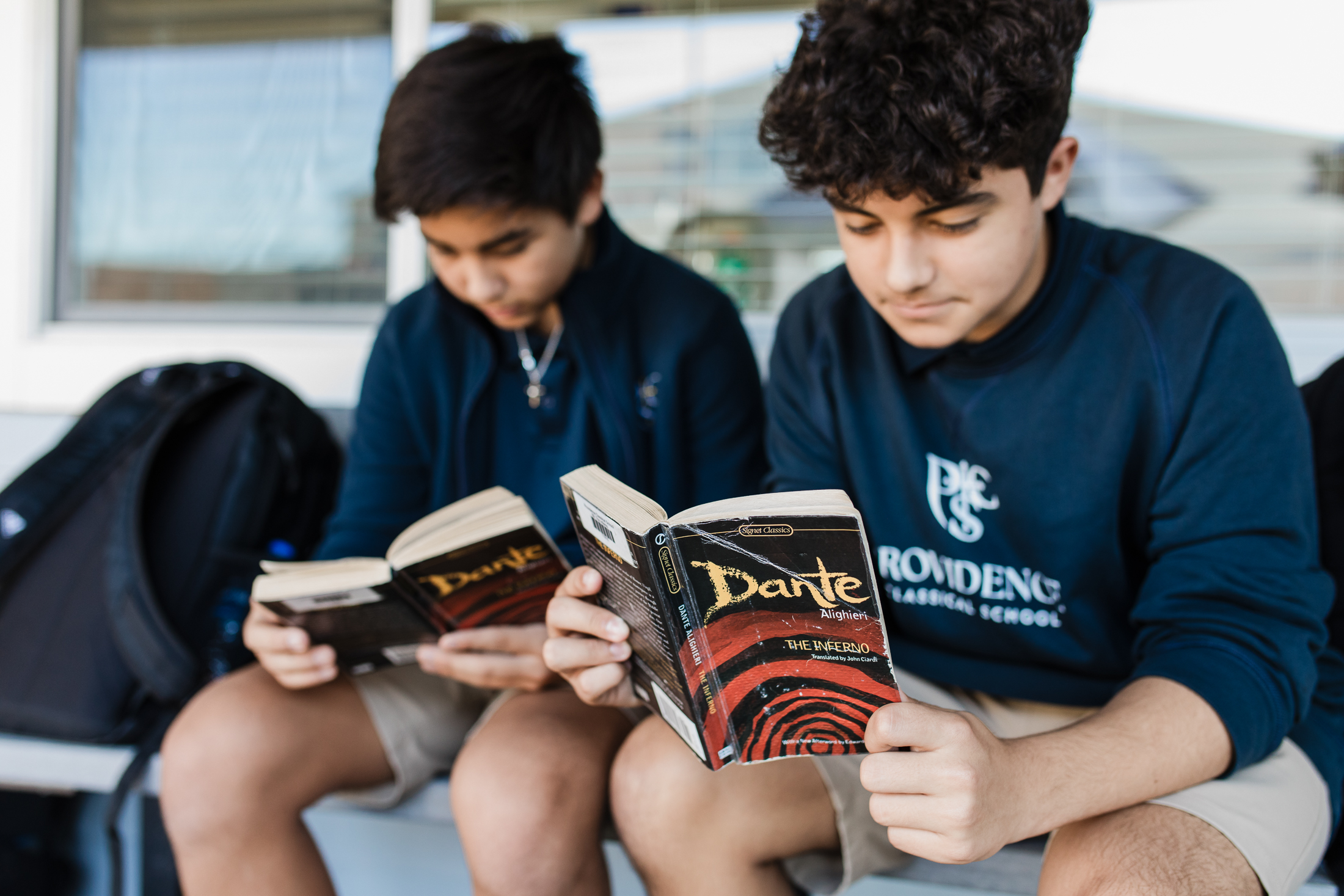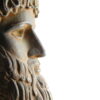Why It’s Important to Read Hard Books: The Case for Intellectual Challenge
By Alicia Williamson, Enrollment Director
In our modern era of instant information and bite-sized entertainment, reading intellectually challenging material can seem like an unnecessary burden. Why struggle through a dense classic novel, a difficult philosophical treatise, or an intricate historical account when easier, more accessible options are available? However, those who embrace the challenge of “hard books” often find their intellectual lives enriched in ways that lighter reading simply cannot provide. In the context of classical education, where the cultivation of wisdom and virtue is paramount, reading hard books is not just beneficial — it is essential.
1. Hard Books Develop Intellectual Stamina
Reading a difficult text requires patience, focus, and perseverance. When a book is challenging, the reader cannot simply coast through it in a passive way. Instead, he or she must engage actively, rereading passages, looking up words, and considering complex ideas. This process strengthens the mind much like physical exercise strengthens the body. In an age where attention spans are shrinking, the discipline developed through reading demanding works is invaluable.
A student who has struggled through The Republic by Plato, The Scarlet Letter by Nathaniel Hawthorne, or The Canterbury Tales by Geoffrey Chaucer will develop the ability to sustain deep thought. This intellectual stamina prepares individuals for rigorous study in any discipline, whether in law, medicine, theology, or philosophy. Even more importantly, it enables them to engage with the weighty questions of life with clarity and insight.

2. Hard Books Teach Us to Wrestle with Big Ideas
Many of the greatest works of literature, philosophy, and theology do not provide easy answers. Instead, they invite the reader into a serious intellectual and moral struggle. Consider Augustine’s Confessions, where the author wrestles with questions of sin, grace, and divine providence. Or regard Shakespeare’s Hamlet, which raises profound questions about justice, revenge, and the meaning of existence. These works challenge us not just to understand but to engage, to debate, and to form our own reasoned conclusions.
By reading hard books, we learn that truth is not always simple. Life’s most significant questions — What is justice? What is virtue? What is the good life? — are not easily answered. Grappling with these texts prepares us for the complexity of real-world ethical and philosophical dilemmas.
3. Hard Books Expand Our Vocabulary and Thinking
The language found in difficult texts is often richer and more sophisticated than what we encounter in everyday life. Engaging with such works stretches our minds, expands our vocabulary, and increases our ability to articulate ideas with precision and nuance. A reader of Milton’s Paradise Lost will encounter words and sentence structures far removed from modern speech, but through perseverance, the reader will come to appreciate the beauty and power of Milton’s language.
Moreover, difficult books introduce us to modes of thought that challenge our preconceptions. They present arguments and perspectives that require careful consideration. This kind of intellectual engagement strengthens our reasoning skills, making us better thinkers and communicators.

4. Hard Books Connect Us to the Great Tradition of Learning
Classical education emphasizes engagement with the “Great Books” — the enduring works of Western civilization that have shaped human thought for centuries. Reading these texts allows us to enter into a grand conversation that spans generations. When we read Aristotle, Aquinas, Bonhoeffer, or Kant, we are not merely absorbing information; we are engaging with some of the greatest minds in history.
This engagement fosters humility, as we recognize that our own insights are part of a larger intellectual heritage. It also instills confidence, as we learn to interact with these thinkers as equals, questioning their ideas and applying their wisdom to contemporary challenges.
5. Hard Books Cultivate Virtue
The classical tradition sees education as the formation of the whole person, not merely the transmission of information. Reading challenging works plays a vital role in this formation. Hard books cultivate virtues such as patience, diligence, and intellectual humility. They teach us to appreciate complexity, to resist simplistic answers, and to cultivate a sense of wonder about the world.
Take, for instance, the discipline required to read and understand a work like The Divine Comedy. A reader who perseveres through Dante’s epic poem is rewarded not only with intellectual insight, but also with a deepened sense of justice, mercy, and the human journey toward God. In this way, difficult reading is not just an academic exercise; it is a moral and spiritual discipline.

6. Hard Books Prepare Us for the Real World
Life is difficult. It requires perseverance, wisdom, and the ability to think critically. Reading hard books is a kind of training for life itself. In the real world, we must grapple with complex problems, discern truth from falsehood, and navigate moral and philosophical dilemmas. If we have spent years training our minds on challenging texts, we will be better equipped to meet these challenges with wisdom and clarity.
Moreover, in professional life, those who can read and interpret complex material, think critically, and articulate their ideas clearly will have a distinct advantage. Whether in business, academia, law, or public service, the ability to engage with difficult material is a skill that sets individuals apart.

In conclusion, reading hard books is not an outdated or elitist pursuit; it is a crucial aspect of intellectual and moral formation. In a world that increasingly favors ease over effort, reading challenging works is an act of resistance — a commitment to the life of the mind and the pursuit of truth.
Classical education has always emphasized the importance of rigorous intellectual engagement. To those who embrace this challenge, the rewards are immense: sharper thinking, deeper wisdom, and a greater appreciation for the complexity and beauty of the world. Thankfully, Providence Classical School students do not have to wrestle with these challenges alone. We have highly qualified teachers who guide students through demanding literature, helping them to understand and engage with the material on a deeper level.
So, pick up that difficult book. Struggle through it. Wrestle with its ideas. In doing so, you will be cultivating not only your intellect but also your character. And that is a pursuit worth undertaking.
For more information on classical Christian education at Providence Classical School,
watch our film, and schedule a tour today!

About Alicia Williamson:
Alicia Williamson earned her B.S. in elementary education from John Brown University and taught middle school math for four years before leaving to raise a family. She has served as the Enrollment Director at Providence Classical School since 2015. Alicia and her husband, Tim, have one Providence graduate and two children enrolled at PCS.
Read more about classical Christian education on the PCS Blog:
The “Good Soil” of Classical Christian Education
Is it Too Late for My Child to Start Classical Christian Education?
The Ministry of Discipleship: Forming Disciples as a Teacher at Providence
Science in the Classical Christian School
The Classical Studio – Integrating Art in the Classical Christian Classroom








